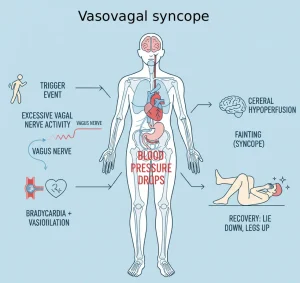Overview
Diagnosis
Diagnosing vasovagal syncope usually begins with a physical examination. During this exam, your healthcare professional listens to your heart and checks your blood pressure. They may also gently massage the main arteries in your neck to see if this action makes you feel lightheaded or faint.
To rule out other possible causes of fainting, especially those related to the heart, several tests may be recommended:
-
Electrocardiogram: This test records your heart’s electrical signals to detect irregular rhythms or other cardiac conditions. You may need to wear a portable heart monitor for a day or longer.
-
Echocardiogram: This test uses ultrasound imaging to view the heart and identify issues such as valve problems that could cause fainting.
-
Exercise stress test: This test monitors heart rhythms while you walk or jog on a treadmill to see how your heart responds to physical activity.
-
Blood tests: These can identify conditions such as anemia that may lead to or worsen fainting spells.
-
Tilt table test: If no heart issues are found, your healthcare professional may recommend this test. While lying on a table that tilts at different angles, your heart rhythm and blood pressure are monitored to see how your body reacts to changes in position.
Treatment
Most cases of vasovagal syncope do not require medical treatment. Your healthcare professional can help you identify what triggers your fainting episodes and guide you on ways to avoid them.
If fainting occurs frequently or affects your daily life, one or more of the following treatments may be suggested:
-
Medicines: Fludrocortisone acetate, a medication often used to treat low blood pressure, may help prevent vasovagal syncope. Selective serotonin reuptake inhibitors (SSRIs) might also be prescribed in some cases.
-
Therapies: Your healthcare professional may suggest techniques to reduce blood pooling in your legs, such as foot exercises, wearing compression stockings, or tightening your leg muscles when standing. Increasing dietary salt intake may also help if your blood pressure is not high. Staying hydrated and avoiding prolonged standing in hot or crowded environments are important preventive measures.
-
Surgery: In rare cases, when other treatments do not work, a pacemaker may be implanted to regulate the heartbeat and reduce fainting episodes.
Advertisement

